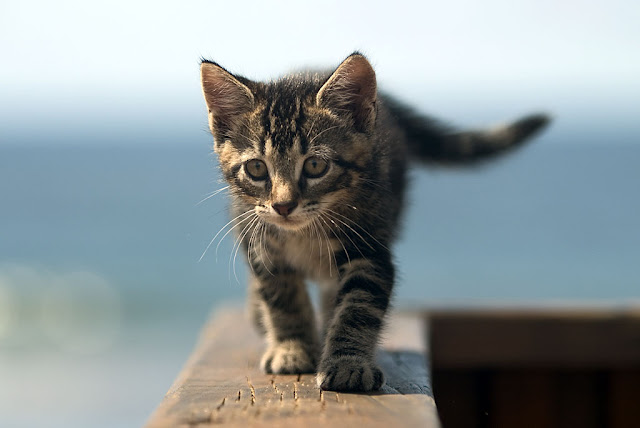It isn't uncommon for us to find ourselves caring for newborn kittens. This may be due to the fact that the mother cat is not able to deal with the care. Sometimes, if the kitten has health problems, the mother will not look after her kitten or will, simply, abandon it.
Whatever the reason may be, someone will have to care for the newborn. This may consist of initially feeding the kitten with a bottle and, later on weaning it to dry food.
The most important thing to consider is keeping the newborn warm. You can do this by using old towels and a cardboard box. A kitten's temperature should be between 95 degrees and 99 degrees. Do not let the temperature fall below 94 degrees or the possibility of going into shock and die. Also, be sure to check the kitten's overall health. Make sure the eyes, nose and ears are free of any pus or discharge. If you see any pus or discharge, consult your veterinarian.
You need to keep your kitten hydrated; I recommend using Pedialyte. You should also provide him/her with supplements, which may be found at your local pet store. You will need to use either a syringe, bottle, or eye-dropper to feed the kitten. You will need to continue feeding in this way for the first 3 weeks. You can then start to wean the kitten to canned food.
Keep in mind the first six weeks are the most important for your kitten, this is when it is most vulnerable to threats like fleas and URI's as well as to other health issues. During this time your kitten will start to develop her/his character and personality, which you will see almost daily.
A kitten's eyes will open around 9 to 14 weeks, however, the he/she will not be able to see very well. Since the eyes won't dilate properly, it is a good idea to keep him/her away from bright lights.
A newborn kitten will need assistance with going to the bathroom. Their digestive system is not yet developed. They will need to be stimulated so it can go to the bathroom. If unsure about this process, please consult your vet.
Raising kittens is a very exciting experience. It is also very important to have a vet nearby; one that you can trust and count on. A kitten should receive its first set of shots when it's around 8 weeks old and then the second set 3 to 4 weeks later. You can get your kitten tested for fleas and worms when he/she is about 8 weeks old.
Useful Links:
Kitten CareKitten Care
Kitten Care
Kitten Care
Kitten Care
Kitten Care
Kitten Care
Kitten Care
Kitten Care
Kitten Care
Kitten Care
Kitten Care
Kitten Care
Kitten Care
Kitten Care
Kitten Care
Kitten Care
Kitten Care
Kitten Care
Kitten Care
Kitten Care
Kitten Care
Kitten Care
Kitten Care
Kitten Care
Kitten Care
Kitten Care
Kitten Care
Kitten Care
Kitten Care
Kitten Care
Kitten Care
